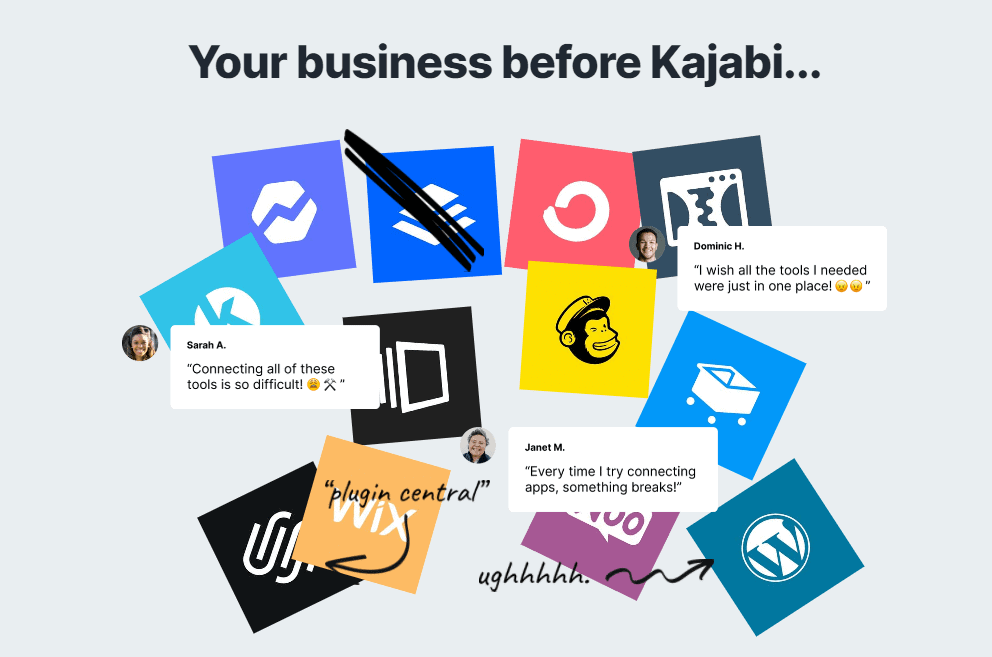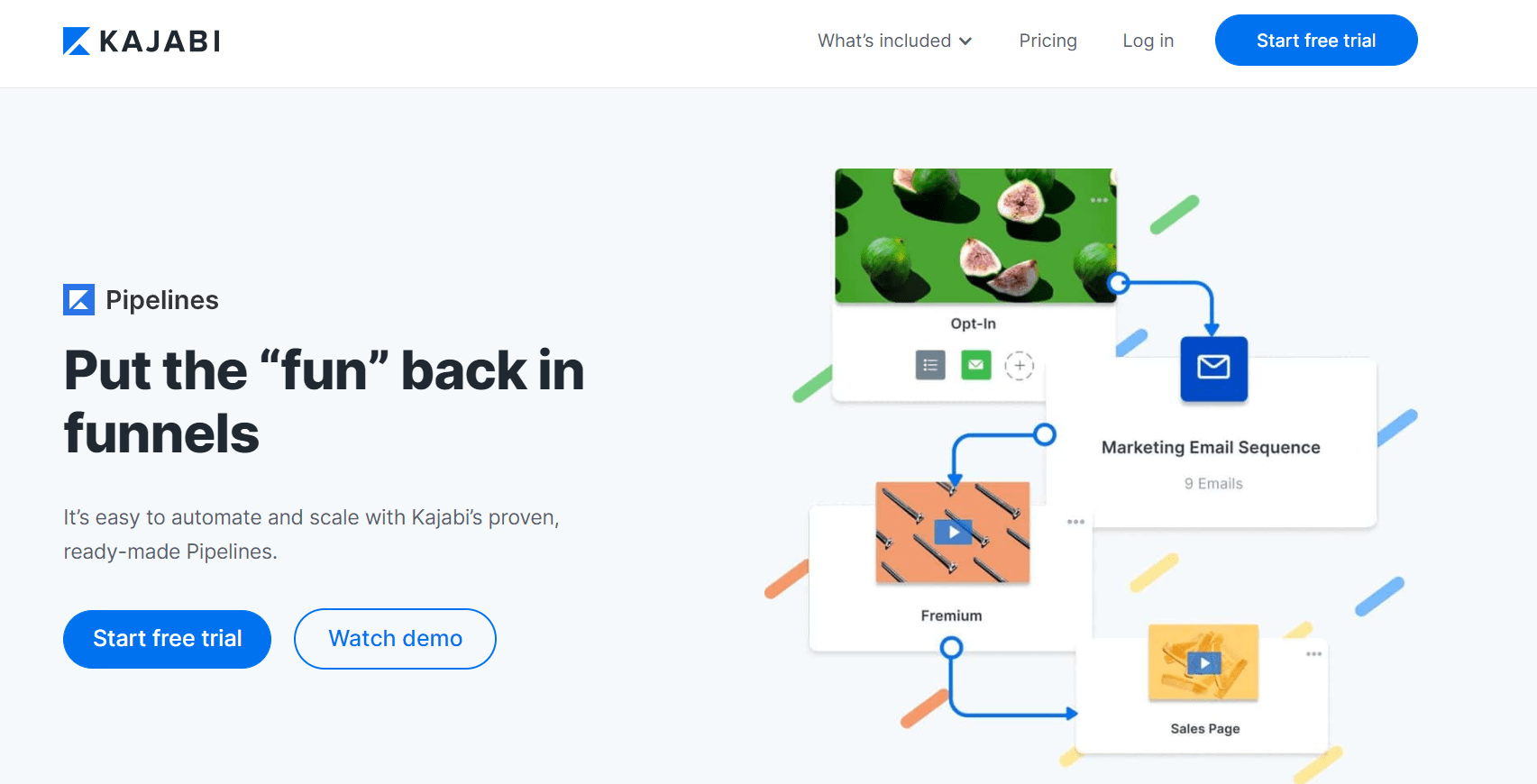Content Outline
Kajabi vs Podia Overview
| Feature | Kajabi | Podia |
|---|---|---|
| Course Creation | Yes, robust course creation tools | Yes, it supports online courses and digital products |
| Website Hosting | Yes, it allows custom domain integration | Yes, it provides customizable storefronts |
| Email Marketing | Yes, basic email marketing is included | Yes, it includes email marketing capabilities |
| Sales Funnels | Yes, it supports creating sales funnels | Limited sales funnel capabilities |
| Membership Sites | Yes, we can create membership sites | Yes, it supports membership subscriptions |
| Pricing | Various pricing plans with different features | Fixed pricing with all features included |
| Transaction Fees | None (0% transaction fees) | None (0% transaction fees) |
| Affiliate Marketing | Available in higher-tier plans | Available in all plans |
| Webinars | Basic webinar features in the higher-tier plan | Not available |
| Customization | Highly customizable | Customizable, but with limitations |
| Customer Support | Priority support in higher-tier plan | Email and chat support for all users |
| Integrations | Offers integrations with various third-party tools | Integrations available for some external services |
| Ease of Use | Generally user-friendly | User-friendly and easy to navigate |
| Payment Processing | Supports Stripe and PayPal | Supports Stripe and PayPal |
About Kajabi
Kajabi is an all-in-one online platform designed for creators, educators, and entrepreneurs. It empowers users to easily create, host, and sell online courses, digital products, and membership sites.
With its intuitive interface, email marketing tools, and customizable websites, Kajabi simplifies the process of building a digital presence and monetizing knowledge or expertise. It offers a range of pricing plans to suit various business needs.
About Podia
Podia is a versatile online platform that caters to creators, artists, and entrepreneurs. It provides an all-in-one solution for selling online courses, digital downloads, webinars, and membership subscriptions.
With its user-friendly interface and fixed pricing model that includes all features, Podia makes it easy for users to launch and manage their digital products and content without worrying about transaction fees. It’s a popular choice for those seeking simplicity and affordability in their online business endeavors.
Kajabi vs Podia: Main Differences

The primary distinctions between Podia and Kajabi are as follows:
- Podia is a better fit for folks who are just starting on a limited budget, while Kajabi seems to be geared for medium-sized firms.
- Podia’s website is more intuitive and easy to browse, but Kajabi’s website is more complicated and less user-friendly.
- Podia is less costly and has fewer features, but Kajabi is much more expensive and has more functions.
As a result, it’s unsurprising that floods of course makers and instructors are on the lookout for the ideal software to assist them in capitalizing on the trend.
Fortunately, there are a plethora of online platforms available to assist you in developing, marketing, and selling your course – each offering something somewhat different. However, as expected, some are more respectable than others. Given the number of options, selecting the ideal learning platform might seem to be a time-consuming and tedious endeavor.
A simple Google search returns an astonishing number of online course builders, many of which offer comprehensive suites filled with features and tempting discounts.
To assist you in narrowing your search, we’re going to offer you a list of significant characteristics and distinctions to consider.
Does it make sense to you? Fab! Therefore, without further ado, let us begin!
Kajabi vs Podia Factors to Consider
1. Email Marketing & Automation
Podia’s email marketing skills are limited. It will not function as a full-featured email marketing platform. And I will explain why.
Podia does not provide a built-in sales funnel or landing page builder. Additionally, it lacks an email list management system that enables you to tag subscribers and segment your list. Again, it lacks email marketing automation guidelines.
As mentioned before, Podia’s email marketing tool allows you to perform two things. These include sending emails to already enrolled students and conducting an onboarding campaign.
However, email marketing in Kajabi is a beast unto itself. You may send email broadcasts or email sequences to your list. This simplifies the process of building a drip campaign.
Additionally, you may construct forms in Kajabi. By embedding these forms on a Kajabi or other website, you may gather opt-in subscribers. Additionally, you may arrange webinars and events using the events tool. You may also send email alerts to your subscriber list for events.
2. Ease of Use
With Kajabi, you can take care of the majority of your business’s requirements in one place. You can promote, send emails, manufacture goods, and live online classes, especially if you are just getting started.
They offer a step-by-step educational approach. Additionally, they are regularly improving features to ensure that even the most inexperienced user can utilize them.
You do not need to learn any coding to use Podia. It’s easy to get started and build your storefronts and product offers.
The customization menu is extensive enough to express your individuality but not so extensive that you get overwhelmed by options. Customers may easily access and purchase things.
I’m going to call this a tie since both systems are geared at assisting both vendors and buyers in every way possible.
3. Course Creator
Both Podia and Kajabi enable course developers to integrate a variety of materials into a cohesive learning experience. Both tools are intended to be as versatile as possible, while their interfaces may be significantly more or less attractive depending on your prior experience.
Podia is an incredibly simple course-building tool that enables you to upload any file and deliver your course material in whatever format you choose.
You may pre-launch courses and gradually roll them out based on your requirements. You begin your course development adventure by deciding on the product you want to create and then working with a blank slate to create it.
Podia’s website does not identify which video hosting service it uses. However, you may submit anything without regard for file size limitations. Kajabi enables you to upload files up to a file size of around 4GB, therefore you may need to do some additional steps.
Kajabi enables users to create courses via the use of “product blueprints.” These blueprints are completely customizable, and they serve as a jumping-off point for designing your courses. With Kajabi, you will have the option of beginning from scratch, which is excellent if you already have a course in mind.

Having the blueprint option ready is advantageous if you’re a complete newbie since it will give you a decent notion of where to begin creating.
You may include video, PDF, and audio files into your site, and there are even possibilities for hosting interactive films and webinars.
You may upload files straight from your PC or through Google Drive or Dropbox with Kajabi. Podia and Kajabi will both aid you in moving your content to their platforms if you have already begun constructing elsewhere.
4. Integrations
Both systems provide a robust integration library.
Kajabi has ten pre-integrated apps, including ClickFunnels, Google Analytics, ActiveCampaign, ConvertKit, Drip, and MailChimp.
Additionally, the platform offers a Zapier connector, which enables over 1000s of non-native application integrations.
You may use Zapier to connect third-party applications that are not included with the platform.
To be precise, you do not need to employ any integrations.
You currently have all the tools you need, so you do not require any further services.
Having said that, if you are already acquainted with and comfortable using another service, you may integrate it.
Integrations with Kajabi are simple to set up and take just a few minutes.

Podia also integrates with several prominent apps, which is advantageous given the limited functionality of some of its email and marketing functions.
Podia integrates with major email marketing platforms such as MailChimp, Drip, and ActiveCampaign.
Additionally, Podia just implemented a Zapier connector, allowing for the customization of integrations with non-native applications. Fortunately, Podia has strong integrations since they compensate for the platform’s inadequacies in other areas.
5. Sales Funnels
Not just email can be automated using Podia and Kajabi. Sales funnels are one of the most effective methods for increasing conversions and income generation for company owners. Essentially, they are tactics that assist you in automating the process of converting a random visitor to a loyal client.

Sales funnels may be comprised of a variety of components, ranging from landing pages and sign-up forms to email marketing campaigns. Podia does provide some sales funnel possibilities, but not nearly as many as Kajabi. Podia enables you to construct email drip campaigns that nurture your customers gradually, but that is all.
Kajabi has a comprehensive sales funnel builder as part of its service. In case you’ve never developed a sales funnel before, the “Pipelines” system includes blueprints for pre-designed sales funnels.
You may create sales funnels for a variety of purposes, including gifts, product launches, free books, webinars, and coaching programs. Everything is quite well-crafted, and you won’t have to bother yourself about coding campaigns and automation.
Naturally, if you like the concept of designing and implementing your bespoke pipelines, you may do so as well. There is also the opportunity to begin a campaign from scratch. While Kajabi’s pipeline functionality is completely automated, you may customize it by adding your code.
6. Designs & Themes
If you’ve ever used a product for which you fell in love with the design, you understand how much aesthetics may impact how an experience feels. When teaching a course, you want a topic that will captivate your students while also promoting your business.
The appropriate design choices can enable you to bolster your online image and establish a closer connection with clients.
Podia enables you to customize a few features of a single basic theme, including the header and body fonts, as well as the background and text colors. Additionally, you may include your logo in a certain material, but that is it.
Although Podia is an all-in-one platform that includes a website builder, blogging is only available on select levels.
Podia does enable you to create FAQ pages, testimonial pages, and a variety of additional blocks for your site. However, there are prebuilt themes that limit your customizing options.
On the other hand, Kajabi enables you to create a whole website using a variety of customizable themes. In the same area, you may create anything from a communal setting to a membership site. Each theme provides the same level of customization for how you want things to appear and feel.
Kajabi enables you to create several different pages for your website by using a variety of different themes. You can customize each aspect with your logo and content, and the majority of the experience is extremely straightforward. Kajabi also provides pop-ups for your website, allowing you to attract visitors’ attention and maybe generate leads.
Kajabi vs Podia: Pros and Cons
Kajabi Pros
- You may use a custom domain name.
- Transparent Frequently Asked Questions (Kajabi University)
- A broader selection of subscription choices
- A mobile application compatible with Android and iOS
- You may operate a blog.
- Possibility of establishing an online community, quizzes, and evaluations
- You may construct a full website from scratch.
- Customer service is available 24 hours a day
- Numerous well-crafted themes
Kajabi Cons
- It is not as simple to browse as the previous website.
Podia Pros
- Access to a ‘course player,’ which allows you to add PDFs, videos, audio files, and text.
- Storage is limitless.
- The capability of developing self-paced courses
- You may make postings that are unique to your customers/members.
- You may include the Podia checkout button in any of your websites.
- They provide a lovely assortment of pre-designed layouts.
- Outstanding customer service, which includes online training and instructions.
- Create end-to-end sales funnels for your online retailer (one-stop-shop)
- There are no transaction costs.
- They provide reasonable price plans.
- Its website is simple to access and use.
Podia Cons
- Podia does not include quizzes or evaluations.
- There is no free plan.
- Podia’s course builder and product pricing choices are less versatile than those of Kajabi.
- There is no provision for the establishment of a customer community area.
- There is no mobile application.
Kajabi vs Podia: Customer Support
Customer support is a crucial aspect when choosing an online platform for your business, and both Podia and Kajabi offer customer support options.
Podia is known for its responsive and attentive customer support. They provide chat support to all users, regardless of their pricing plan.
This means you can quickly get assistance and answers to your questions whenever you need them.
Additionally, Podia has a creator-friendly reputation, with a high customer friendliness score of 90.91, indicating its commitment to helping users succeed.
Kajabi also offers customer support through chat, and they provide priority support to users on their higher-tier plans.
While their customer support is generally effective, their customer friendliness score is lower at 68.83 compared to Podia.
However, Kajabi does have an active user community and extensive documentation to help users troubleshoot issues independently.
Both platforms aim to assist their users effectively. Still, Podia’s consistent availability of chat support and higher customer friendliness score may be advantageous for those who prioritize readily accessible and user-focused support.
Quick Links
FAQs : Kajabi vs Podia
❓What is the main difference between Podia and Kajabi?
The main difference is in their pricing models and feature sets. Podia offers a fixed pricing structure with all features included, while Kajabi offers tiered pricing with different feature levels. Kajabi is known for its advanced course creation and sales funnel capabilities, while Podia offers simplicity and affordability.
👀 Do both Podia and Kajabi charge transaction fees on sales?
No, neither Podia nor Kajabi charges transaction fees on sales. You get to keep 100% of your revenue on both platforms.
✅Does Podia or Kajabi offer built-in affiliate marketing programs?
Both Podia and Kajabi offer built-in affiliate marketing programs, allowing you to create affiliate partnerships and manage commissions for your products or courses.
❓Can I migrate my existing content or website to these platforms?
Podia offers free migrations, making it easy to transfer your content from another platform. Kajabi, on the other hand, does not offer free migrations.
Conclusion – Kajabi vs Podia: Which is better?
Both Podia and Kajabi provide a wealth of built-in functionality and a slew of connectors, both on the platforms and through Zapier.
Choosing the best option for your course is not always straightforward, especially when you want additional features like payment plans, opt-in forms, and the simplicity of an easy-to-use backend.
If you value the simplicity of use and adaptability above all else, Podia is likely to be your first pick. It’s simple enough for novices yet has enough functionality to aid with scaling.
Alternatively, if you’re looking for something more complex from the start, with extensive sales funnels and access to outstanding templates or blueprints, try Kajabi.
In any case, you’re certain to get the resources you need inside these two immersive platforms to guarantee that your audience receives fantastic results—best of luck with the development of your online course or membership business.











